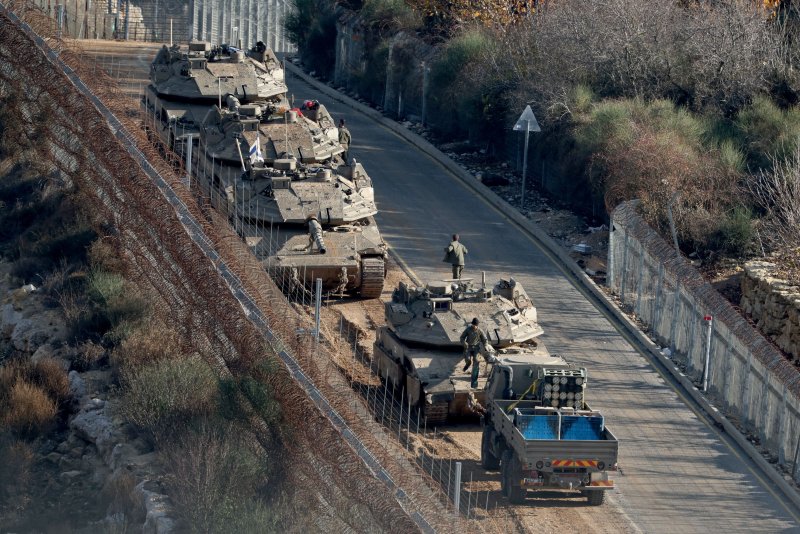Israeli tanks deploy next to the security fence near the Druze village of Majdal Shams on Israel border with Syria in the Israeli-annexed Golan Heights on Sunday. The Israeli army announced it has deployed forces to strengthen the defense of the Golan Heights and the eastern Israeli-border with Syria. Photo by Atef Safadi/EPA-EF
Dec. 8 (UPI) — Israeli forces on Sunday seized a buffer zone in the Golan Heights established by a 1974 ceasefire agreement with Syria, whose rule by President Bashar Assad ended with takeover by rebels.
Israeli Prime Minister Benjamin Netanyahu said Sunday said the agreement had collapsed as Syrian troops had abandoned their positions.
The prime minister, at the Israeli-Syrian border, shared a video on X and wrote: “This is a historic day in the history of the Middle East. We will not allow any hostile force to establish itself on our border.”
In the 1967 Yom Kippur Mideast war, Israel captured the Golan Heights.
The international community, except for the United States, views this area as occupied Syrian territory.
“The IDF has deployed troops in the buffer zone and in a number of areas that are necessary to defend, in order to ensure the security of the communities in the Golan Heights and the citizens of Israel,” Israel Defense Forces said in a statement.
“We emphasize that the IDF is not interfering with the internal events in Syria. The IDF will continue to operate as long as necessary in order to preserve the buffer zone and defend Israel and its civilians.”
IDF troops also said: “In accordance with the understanding between Israel and Lebanon, IDF troops currently operating in southern Lebanon to prevent Hezbollah from deploying and to remove threats. Storage facilities with hundreds of anti-tank rockets, mortars, grenades, and a vehicle equipped with a rocket launcher were located and dismantled as well as several underground tunnel shafts.”
The Lebanese army has deployed reinforcement troops along its eastern and northern borders with Syria, according to an army statement released on Sunday.
“The units tasked with monitoring and controlling the northern and eastern borders have been reinforced, in conjunction with tightening monitoring procedures. Units deployed throughout Lebanon are also implementing exceptional measures to maintain security and protect civil peace,” the army said.
The Israeli military carried out the deployment to the buffer zone in coordination with the United Nations Disengagement Observer Force, which controls the area. UNDOF members remained in their positions.
Israel had warned rebel forces in southern Syria not to approach the buffer zone.
The nation launched airstrikes in Syria, hitting weapons factories, including chemical weapons sites near Damascus. This was an effort to prevent them from falling into the hands of rebel groups, according to Syrian media reports.
Also, U.S. forces conducted airstrikes in central Syria on Sunday, which targeted “ISIS leaders, operatives and camps” using multiple Air Force assets – including B-52 bombers, F-15 fighter jets and A-10 aircraft – an American official said.
“CENTCOM, together with allies and partners in the region, will continue to carry out operations to degrade ISIS operational capabilities even during this dynamic period in central Syria,” the official said in a report by CNN.
The IDF’s 98th Division with the Paratroopers and Commando brigades was dispatched to the Golan Heights on Sunday morning.
The Israeli military’s Arabic spokesperson issued an “urgent warning” to residents in southern Syria after Israel sized the buffer zone.
In a post on X, Avichay Adraee issued warnings for five areas. Adraee said that “fighting in your area is forcing the IDF to take action, and we do not intend to harm you.”
He added: “For your safety, please remain in your homes and do not go outside until further notice.”
There were no changes to guidelines for residents of the Golan Heights despite IDF’s increasing presence in the areas and forces were on high alert.
Agricultural areas near Merom Golan, Ein Zivan, Buq’ata and Khirbet Ein Hura are off-limits for civilians until the end of the month.
Schools in the four Druze communities in the northern Golan Heights – Buq’ata, Ein Qiniye, Mas’ade and Majdal Shams – would carry out studies online on Sunday. Day cares would still operate there.
Dspora Affairs Minister Amichai Chikli, a member of the ruling Likud party, wants further action against Syria Sunday, writing on X that Israel should completely take over the buffer zone.
“The events in Syria are far from being a reason for celebration,” Chikli said. “The bottom line is that most of Syria is now controlled by subsidiaries of al-Qaeda and ISIS.”
Opposition Leader Yair Lapid said it is “more important than ever to create a strong regional coalition, with Saudi Arabia and the Abraham Accords countries, to deal together with the regional instability.”
